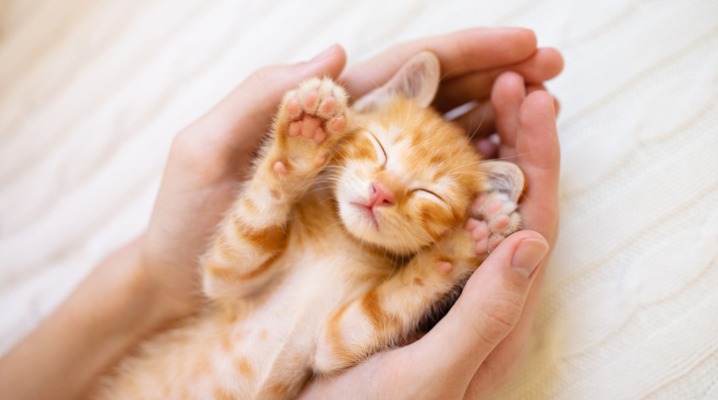
Help Your Kitten Grow into a Healthy Cat
Kittens are adorable, small bundles of love, and adopting one just might be one of the highlights of your life. However, they also require a lot of attention and care in order to grow up happy and healthy.
Caring for a kitten is a little different from caring for an adult cat. Because they are so young and undeveloped, kittens need a lot of extra nutrients and preventative care to ensure they develop properly and have lifelong health.
Here’s what you should know about caring for kittens so they grow into healthy adult cats.
Take note of your kitten’s development
Much like in human babies, a kitten develops a lot throughout its first year. After 12 months, a kitten is considered an “adult” cat, but a lot changes before it hits that milestone. During this time, you should be aware of a few key points in your kitten’s life where you should pay extra special attention.

First 2 Weeks
This is the most delicate time in a kitten's life. If you have a cat who has given birth to a litter and are raising kittens at home, you’ll want to provide these kittens with a lot of care. At this age, kittens will learn to see and hear, as well as explore their surroundings little by little. Kittens also nurse from their mothers during this time, generally starting to wean after around five weeks and eating solid food by nine weeks.
8 Weeks Old
At this point in your kitten's life, he or she kitten will need to visit the vet to begin its first rounds of vaccinations. These are critical in preventing dangerous diseases and viruses that could be fatal to young kittens.
2 to 6 Months Old
As your kitten starts to grow more active and curious, he or she will begin to play and explore a lot more. You should begin safely and slowly socializing your kitten with people and animals so it gets more comfortable in its environment.
4 Months Old
At this time your kitten will begin to teeth. It should have all its baby teeth by ten weeks, but these will be pushed out to make room for adult teeth. Most kittens have all 30 adult teeth by six months of age. Watch your kitten to make sure it isn’t chewing on dangerous objects in an attempt to soothe its aching gums.
6 Months Old
Your kitten should also be spayed or neutered at least by the half year mark; however, many cats get the procedure beginning as early as two months old. Although people sometimes think the process is unnecessary, spaying or neutering your cat can actually extend its life and reduce its risk for diseases.
7 to 12 Months Old
In the later half of your kitten's first year, he or she will continue to grow, though not quite as rapidly as in the earlier months. Continue to feed your kitten high-quality kitten food and fresh water, play frequently, and give lots of love. This way your adorable little fluffball will reach the one-year mark as healthy and happy as possible.
Miscellaneous care tips
As you can see, there’s a lot of work that goes into a kitten’s development. Here are some additional tips to ensure lifelong health for your kitten.

- Immunizations: Visit the veterinarian on their recommended schedule to ensure your kitten gets all the vaccinations required. Very young kittens will need a series of immunizations, rather than a single vaccine once a year or every three years. Boosters are generally administered every few weeks between the ages of eight and 16 weeks.
- Feed high-quality kitten food: Often, kitten food is specially formulated with extra protein, vitamins and minerals that help kittens grow. Feeding your kitten adult food may not provide the nutrients needed to sustain healthy development and all that kitten energy! To help sustain all-day energy, it may be a good idea to allow your kitten to feed by grazing throughout the day rather than only in specific mealtimes.
- Supervision is key: Many kittens are extremely curious and may find themselves in sticky situations, whether that’s chewing on an electrical wire or tangling themselves in cords and strings. Make sure you’re keeping the kitten away from any potentially dangerous areas and “kitten-proof” your home to prevent injury.
- Weigh kittens as they age: Weighing your kitten once a month is generally a good idea. This way, you can more easily monitor growth and ensure he or she is not gaining or losing weight too rapidly over time. If anything seems off, call your veterinarian for advice.
- Practice grooming early: Teaching your cat to be comfortable having nails trimmed and teeth brushed later in life can be challenging. It’s much easier to establish these routines when your kitten is young so you will have a better time taking care of his or her oral hygiene and grooming throughout life.
If you have any questions or concerns about raising your kitten, don’t hesitate to inquire with your veterinarian. They will give you the information you need to ensure your kitten grows up to be a healthy, well-developed adult cat.


